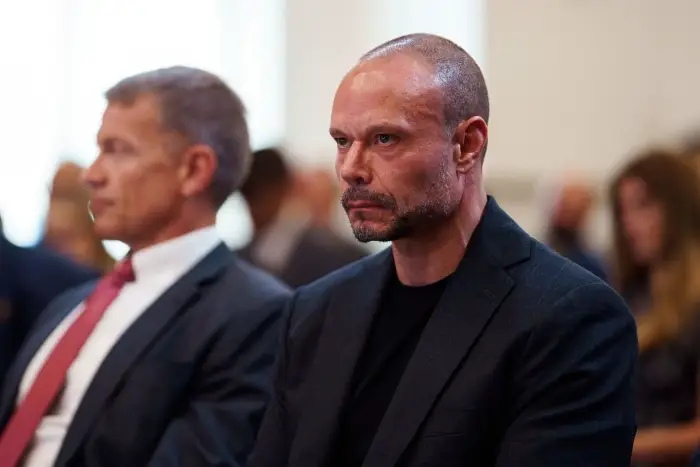In a striking and enigmatic statement that has sent ripples through political and law enforcement circles alike, Dan Bongino, the embattled FBI Deputy Director, disclosed that his tenure has exposed him to information so deeply disturbing it has “shocked me down to my core.” With growing public scrutiny over how sensitive Jeffrey Epstein files have been handled, Bongino’s social media remarks promise a relentless pursuit of justice and truth—a promise that many observers say could reshape the ongoing saga.
A Promise of Truth in a Shrouded Investigation
On a recent social media post that quickly went viral, Bongino vowed to conduct what he called “righteous and proper investigations by the book and in accordance with the law.” He insisted that the effort would yield “the answers WE ALL DESERVE.” His careful wording—“Not ‘my truth,’ or ‘your truth,’ but THE TRUTH”—struck a chord amid a fraught political climate marked by fierce partisan battles and conspiracy theories.
“We cannot run a Republic like this,” Bongino warned, emphasizing the gravity of what he had uncovered. “I’ll never be the same after learning what I’ve learned.” Yet, despite the bombshell nature of his comments, Bongino was coy about specifics, saying only that “things are happening” but refraining from offering any timeline for public disclosure.
Many have interpreted these remarks as a direct response to the backlash Bongino and FBI Director Kash Patel have faced regarding their handling of the Epstein files—an investigation that has been fraught with controversy, secrecy, and allegations of cover-ups.
The Epstein Files Controversy: A Backdrop of Suspicion
At the heart of the storm is the so-called Epstein client list—documents believed to detail prominent individuals linked to Jeffrey Epstein’s child sex trafficking network. The files have been a magnet for speculation since their existence became publicly known, raising questions about who might be implicated and whether justice would be served.
Bongino has long been a vocal proponent of claims suggesting the existence of a wider Epstein client list, insisting that powerful figures were involved. However, earlier this month, after a Department of Justice letter stated that Epstein had committed himself and that no other individuals from the files would be charged, Bongino publicly expressed deep frustration.
He threatened to resign in protest, signaling his discontent with what he perceived as mismanagement and lack of transparency. His failure to appear at work on the Friday following the letter’s release fueled speculation that he might indeed step down. Although he eventually showed up a few hours late, the incident shook confidence among officials and raised questions about internal discord.
Political Fallout: Trump’s Anger and Bondi’s Role
Sources familiar with the situation told the Daily Mail that then-President Donald Trump was incensed by Bongino’s public criticisms, especially given that Bongino was one of Trump’s own appointments. The tension extended to Attorney General Pam Bondi, whom Bongino reportedly demanded to resign alongside him, indicating the depth of dissatisfaction with how the investigation was being handled at the highest levels.
The Wall Street Journal revealed in May that Bondi informed Trump that his name appeared in the Epstein files—information that apparently intensified the political stakes. Bondi also allegedly advocated withholding the files from the public due to the sensitive nature of their content, which included disturbing photographs of child sexual abuse.
The Trump-Epstein Connection: History and Allegations
The Epstein files’ release inevitably revived scrutiny of Donald Trump’s historical ties to Epstein and Ghislaine Maxwell, Epstein’s longtime associate and convicted sex trafficker. During the 1980s and 1990s, Trump was known to socialize with Epstein and Maxwell, both part of a glittering but dark world of elite power brokers.
Maxwell, now serving a 20-year sentence for her role in the trafficking ring, was questioned by Deputy Attorney General Todd Blanche just this week. The 63-year-old has indicated willingness to testify before Congress, potentially shedding new light on Epstein’s network and the complicity of others.
Maxwell’s Strategy and Trump’s Pardon Possibility
Intriguingly, sources close to the investigation suggest Maxwell is leveraging her cooperation to negotiate leniency. She reportedly “didn’t hold back” during questioning, fueling speculation that she may be angling for a presidential pardon.
Trump has neither confirmed nor denied such a possibility. When pressed on the matter, he told reporters: “I’m allowed to do it, but it’s something I haven’t thought about.” The statement leaves the door open, sparking debate over the politics and ethics of presidential pardons in cases involving high-profile figures accused of heinous crimes.
What Does It All Mean for Justice?
It is critical to note that a name appearing in the Epstein files does not automatically imply guilt or involvement in criminal activities. Legal experts caution that accusations must be substantiated with evidence and due process must prevail.
Nevertheless, Bongino’s comments and the surrounding turmoil underscore the intense pressure on the Justice Department and FBI to unravel a web of alleged corruption, abuse, and complicity that has shaken public trust.
Looking Ahead: The Road to Transparency
With Bongino’s vow to uncover “THE TRUTH,” eyes are on forthcoming investigations that may finally clarify longstanding questions. Will new revelations emerge about the depths of Epstein’s network? Will political appointees and powerful elites face accountability?
As the country waits, the Epstein saga remains a potent reminder of the challenges in pursuing justice amid political interference, secrecy, and public skepticism.

Adrian Hawthorne is a celebrated author and dedicated archivist who finds inspiration in the hidden stories of the past. Educated at Oxford, he now works at the National Archives, where preserving history fuels his evocative writing. Balancing archival precision with creative storytelling, Adrian founded the Hawthorne Institute of Literary Arts to mentor emerging writers and honor the timeless art of narrative.
